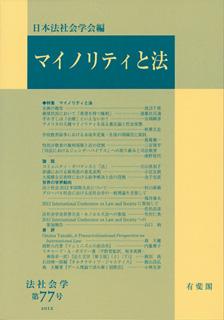2012 巻, 77 号
マイノリティと法
選択された号の論文の20件中1~20を表示しています
- |<
- <
- 1
- >
- >|
マイノリティと法
-
2012 年2012 巻77 号 p. 1-5
発行日: 2012年
公開日: 2021/04/19
PDF形式でダウンロード (908K) -
2012 年2012 巻77 号 p. 6-13
発行日: 2012年
公開日: 2021/04/19
PDF形式でダウンロード (918K) -
2012 年2012 巻77 号 p. 14-34
発行日: 2012年
公開日: 2021/04/19
PDF形式でダウンロード (982K) -
2012 年2012 巻77 号 p. 35-64
発行日: 2012年
公開日: 2021/04/19
PDF形式でダウンロード (1009K) -
2012 年2012 巻77 号 p. 65-87
発行日: 2012年
公開日: 2021/04/19
PDF形式でダウンロード (1031K) -
2012 年2012 巻77 号 p. 88-106
発行日: 2012年
公開日: 2021/04/19
PDF形式でダウンロード (961K) -
2012 年2012 巻77 号 p. 107-133
発行日: 2012年
公開日: 2021/04/19
PDF形式でダウンロード (993K)
論説
-
2012 年2012 巻77 号 p. 135-166
発行日: 2012年
公開日: 2021/04/19
PDF形式でダウンロード (1009K) -
2012 年2012 巻77 号 p. 167-196
発行日: 2012年
公開日: 2021/04/19
PDF形式でダウンロード (1005K) -
2012 年2012 巻77 号 p. 197-228
発行日: 2012年
公開日: 2021/04/19
PDF形式でダウンロード (1047K)
世界の学界動向
-
2012 年2012 巻77 号 p. 229-233
発行日: 2012年
公開日: 2021/04/19
PDF形式でダウンロード (915K) -
2012 年2012 巻77 号 p. 234-240
発行日: 2012年
公開日: 2021/04/19
PDF形式でダウンロード (920K) -
2012 年2012 巻77 号 p. 241-246
発行日: 2012年
公開日: 2021/04/19
PDF形式でダウンロード (921K) -
2012 年2012 巻77 号 p. 247-250
発行日: 2012年
公開日: 2021/04/19
PDF形式でダウンロード (909K) -
2012 年2012 巻77 号 p. 251-257
発行日: 2012年
公開日: 2021/04/19
PDF形式でダウンロード (919K)
書評
-
2012 年2012 巻77 号 p. 259-265
発行日: 2012年
公開日: 2021/04/19
PDF形式でダウンロード (928K) -
2012 年2012 巻77 号 p. 266-271
発行日: 2012年
公開日: 2021/04/19
PDF形式でダウンロード (922K) -
2012 年2012 巻77 号 p. 272-278
発行日: 2012年
公開日: 2021/04/19
PDF形式でダウンロード (926K) -
2012 年2012 巻77 号 p. 279-286
発行日: 2012年
公開日: 2021/04/19
PDF形式でダウンロード (794K) -
2012 年2012 巻77 号 p. 287-293
発行日: 2012年
公開日: 2021/04/19
PDF形式でダウンロード (924K)
- |<
- <
- 1
- >
- >|
